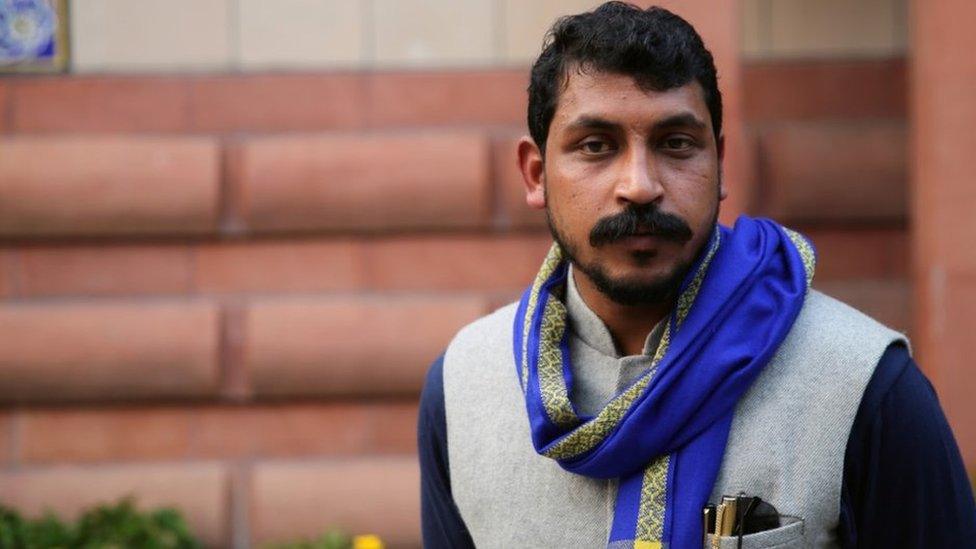India's BJP tells opposition to 'accept defeat with grace'
- Published
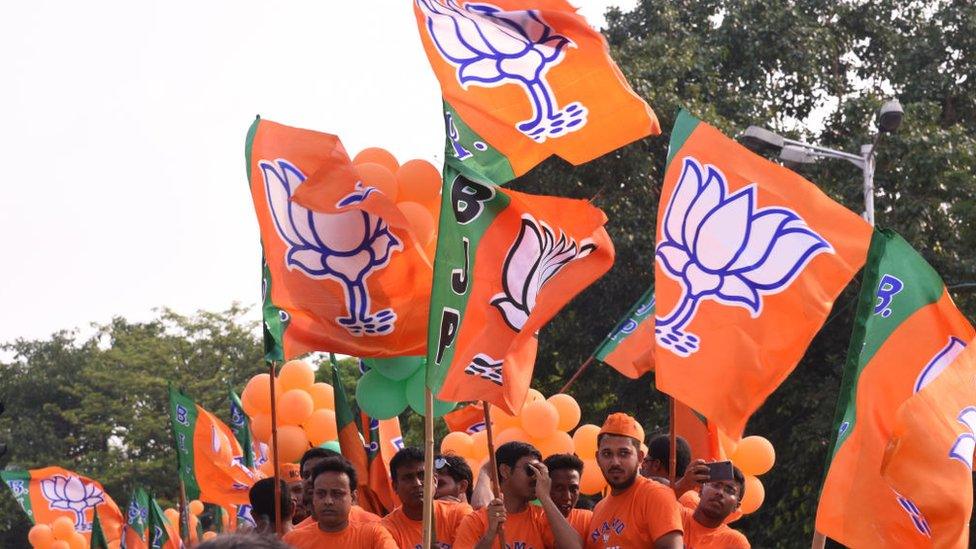
India's election is nearly over: voting began on 11 April, and the final ballot was cast on 19 May with results out on 23 May. Every day, the BBC will be bringing you all the latest updates on the twists and turns of the world's largest democracy.
What happened?
The governing Bharatiya Janata Party (BJP) has told opposition parties to accept "defeat with grace" after a slew of exit polls suggested that the ruling party would get a comfortable majority and form the next government.
Opposition parties have not only rejected the the exit polls but have also raised concerns of vote fraud. A number of videos, allegedly showing Electronic Voting Machines (EVMs) being tampered with, went viral on social media on Tuesday.
These prompted several leaders from opposition parties to meet election officials to raise their concerns.
They have demanded more transparency in the counting process.
But the BJP has rejected their concerns.
"EVM is good when Mamata Banerjee became West Bengal chief minister twice and Amarinder Singh became Punjab chief minister. If they win, EVM is good. But when there is expectation that we will win because people of this country want Narendra Modi to be prime minister again, then EVM is unreliable. The BJP condemns their (opposition) conduct and will tell humbly to accept their defeat with grace," Law Minister Ravi Shankar Prasad said.
Why does this matter?
These allegations have left a bitter taste in the aftermath of the mammoth election in the world's largest democracy, souring what should have been a triumphant achievement for the Election Commission (EC).
The bitter war of words between the ruling and opposition parties ahead of counting day on Thursday forced the EC to issue a series of "confidence-building" statements.
Opposition parties said the EC was "yet to come out with a mechanism" to deal with a mismatch between an EVM result and the corresponding paper trail.
During voting, EVMs are connected to a Voter-Verifiable Paper Audit Trail (VVPAT) machine, which dispenses a slip of paper with the symbol of the party the voter selected.
The Supreme Court has ordered the EC to tally the results from five EVMs with VVPAT receipts in at least five polling stations in every assembly seat. A parliamentary constituency comprises several assembly seats.
But opposition parties say that the tally should be done for the entire constituency in case of a mismatch.

On Tuesday: India poll officials deny 'vote fraud'
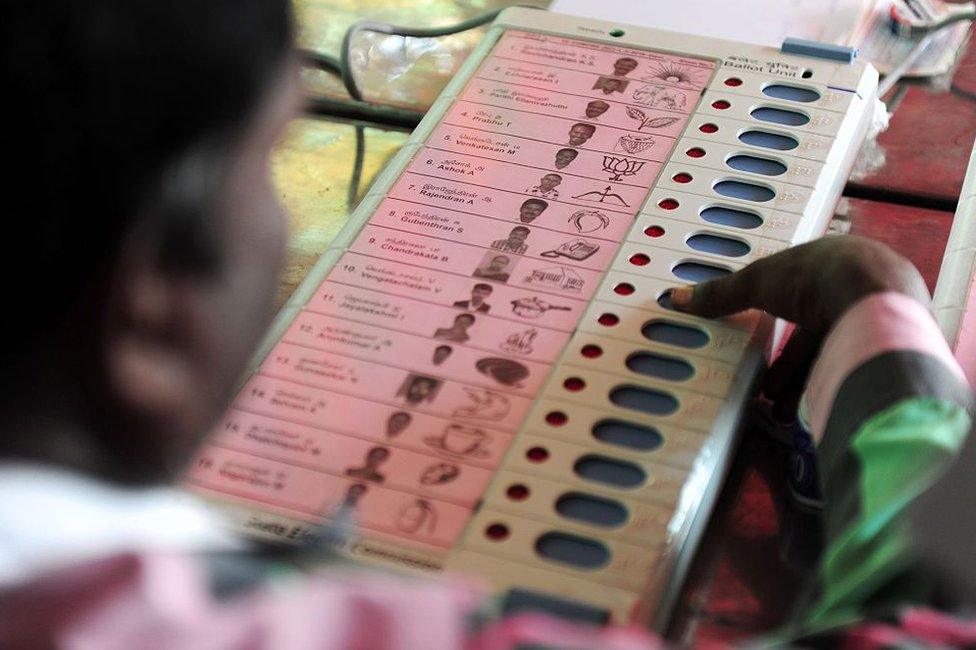
More than 1.5 million e-voting machines will be used in the summer elections
What happened?
India's Election Commission has denied allegations that voting machines had been tampered with in parts of India.
India's opposition parties are meeting the election watchdog on Tuesday to demand more transparency in counting of votes on 23 May (Thursday).
Opposition leaders said the EC had to ensure that there was no possibility of anybody manipulating the Electronic Voting Machines (EVMs) which were used to record votes in the general election that concluded on Sunday.
In Uttar Pradesh's Ghazipur constituency, a candidate belonging to the opposition Bahujan Samaj Party held a protest outside a room where the machines have been stored ahead of the counting. The candidate alleged that attempts were being made to take out the machines from the storage room.
Local officials have said the allegations are baseless.
Allow X content?
This article contains content provided by X. We ask for your permission before anything is loaded, as they may be using cookies and other technologies. You may want to read X’s cookie policy, external and privacy policy, external before accepting. To view this content choose ‘accept and continue’.
In Chandauli constituency, supporters of Samajwadi Party have circulated a mobile phone clip, alleging that some machines were being brought to the counting station on Monday, a day after the election.
Local officials have said the machines shown in the video are reserve machines which had been brought from another part of the constituency because of logistical reasons.
The Election Commission has insisted that "proper security and protocol" was maintained in storing the electronic voting machines.
Why does this matter?
The move comes after a slew of exit polls predicted that the governing Bharatiya Janata Party (BJP) would get a comfortable majority in parliament to form a government.
Sitaram Yechury from the Left Front said the EC was "yet to come out with a mechanism" to deal with a mismatch between an EVM result and the corresponding paper trail.
During voting, EVMs are connected to a Voter-Verifiable Paper Audit Trail (VVPAT) machine, which dispenses a slip of paper with the symbol of the party the voter selected.
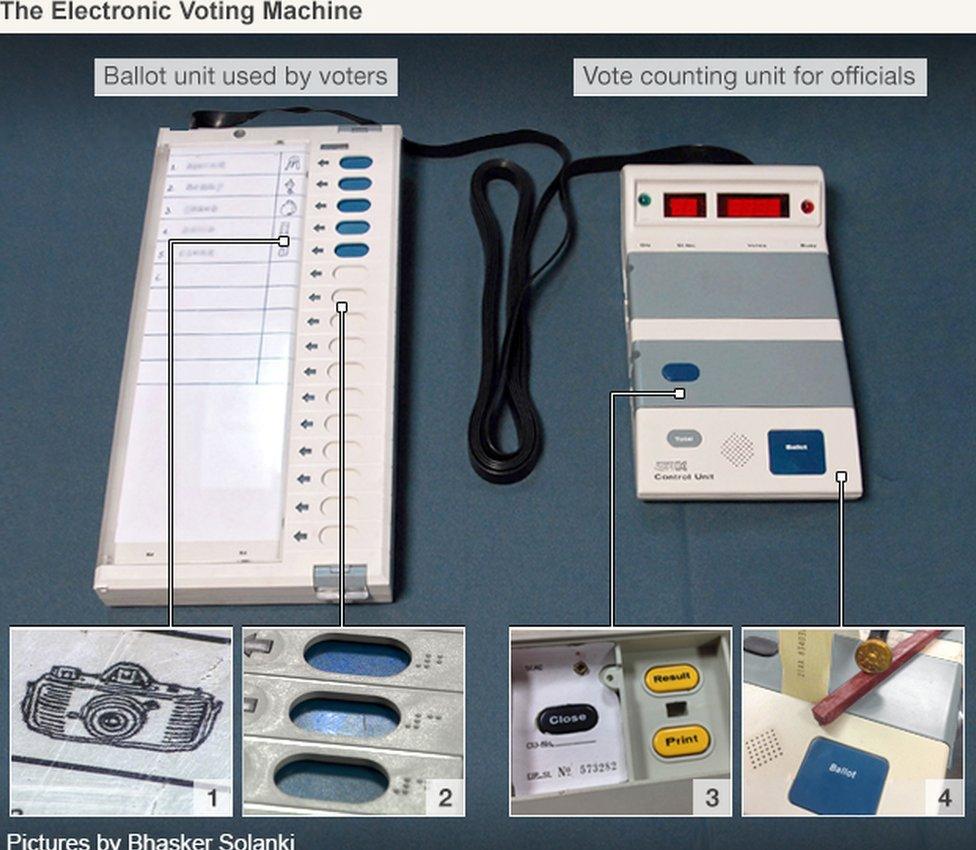
The Supreme Court has ordered the EC to tally the results from five EVMs with VVPAT receipts in at least five polling stations in every assembly seat. A parliamentary constituency comprises several assembly seats.
But opposition parties say that the tally should done for the entire constituency in case of a mismatch.
"On VVPATs and the EVM tally, the EC is yet to come out with a procedure in case there is a mismatch. Even if there is one mismatch in the EVMs or VVPAT samples picked for counting, to maintain the integrity of the electoral process, all VVPATs in that Assembly segment must be counted. This is important to maintain integrity of the electoral process," Mr Yechury said.
If this were to happen however, it would considerably slow down the counting process and declaration of results.

PM Modi tweets tribute to former PM Rajiv Gandhi
What happened?
Prime Minister Narendra Modi has tweeted on the occasion of the death anniversary of former PM Rajiv Gandhi.
Allow X content?
This article contains content provided by X. We ask for your permission before anything is loaded, as they may be using cookies and other technologies. You may want to read X’s cookie policy, external and privacy policy, external before accepting. To view this content choose ‘accept and continue’.
Mr Modi has repeatedly attacked Mr Gandhi on the campaign trail and his slurs have prompted widespread criticism.
He called Mr Gandhi the "number one corrupt man in the country" at a rally earlier this month in the northern state of Uttar Pradesh. A few days later, he went after Mr Gandhi again - accusing him of using a naval aircraft carrier to take him and his family to an island for a "family holiday".
Mr Gandhi was assassinated by a suicide bomber in 1991 during a campaign rally.
Why does this matter?
Mr Modi's tweet marking Mr Gandhi's death anniversary is customary - but it has garnered attention because he attacked the former prime minister repeatedly while campaigning and didn't back down when challenged.
Many were taken aback by Mr Modi's criticism of Mr Gandhi. It elicited condemnation not just from the main opposition Congress party, but other regional opposition leaders, political commentators and even former political opponents of Mr Gandhi.
Analysts said the comments were a sign of "desperation" and showed that Mr Modi "knew" his party was not going to perform as well as expected in the election.
Now that campaigning is over and the election is nearly at an end, Mr Modi seems to be abandoning acerbic rhetoric for something more conciliatory.

On Monday, opposition rejects exit poll results

What happened?
Opposition leaders have dismissed the exit polls, which suggest that the governing Bharatiya Janata Party (BJP) is on course to win the general election.
Allow X content?
This article contains content provided by X. We ask for your permission before anything is loaded, as they may be using cookies and other technologies. You may want to read X’s cookie policy, external and privacy policy, external before accepting. To view this content choose ‘accept and continue’.
A slew of exit polls released on Sunday predict big wins for the BJP-led National Democratic Alliance (NDA). The highest poll prediction for the NDA is 365 seats, and the lowest is 242.
An average of all exit polls gives the NDA 295 seats. Any party or coalition needs at least 272 seats to secure a majority in parliament and form a government.
The BJP welcomed the prediction and many of its leaders congratulated party workers' efforts on social media.
Why does this matter?
Exit polls have to be taken with caution because they have been wrong in the past - a fact that opposition leaders were quick to point out.
Allow X content?
This article contains content provided by X. We ask for your permission before anything is loaded, as they may be using cookies and other technologies. You may want to read X’s cookie policy, external and privacy policy, external before accepting. To view this content choose ‘accept and continue’.
Allow X content?
This article contains content provided by X. We ask for your permission before anything is loaded, as they may be using cookies and other technologies. You may want to read X’s cookie policy, external and privacy policy, external before accepting. To view this content choose ‘accept and continue’.
The BJP is locked in a fierce electoral battle with the Congress and a clutch of regional parties in various states. But the trends suggest that the opposition's strategy may have failed.
The most surprising prediction has come from the bellwether state of Uttar Pradesh (UP), which sends 80 MPs to parliament - more than any other.
So the state always holds the key to who forms the government - in 2014, the BJP won 71 seats.
Analysts had predicted that powerful regional parties would comfortably defeat the BJP this time around. But most of the exit polls suggest the party will perform much better than expected in UP - winning anything between 38 to 68 seats.
Only two polls - Nielsen-ABP and NewsX-Neta - have predicted that the BJP would lose at least 40 seats in UP to regional parties. Nielsen-ABP says the NDA will win 22 seats in the state, while NewsX-Neta gives the coalition only 33 seats.
These are the the only two polls which predict that the BJP-led alliance could fall short of an outright majority.

India votes 2019

How do you vote in the election?
Here's a video explaining everything that happens inside a polling station - and what happens to your vote after that:
Journey of a vote

Coverage from previous weeks:
6-10 May: PM Modi goes after Rajiv Gandhi and Rahul Gandhi apologises to the Supreme Court of India
1-5 April: Congress presents manifesto and Facebook does a political purge
18-22 March: PM Modi's space address and Congress' ambitious income scheme
11-15 March: From Priyanka Gandhi's debut to a contentious UN vote


- Published26 September 2018

- Published10 April 2019
- Published2 April 2019
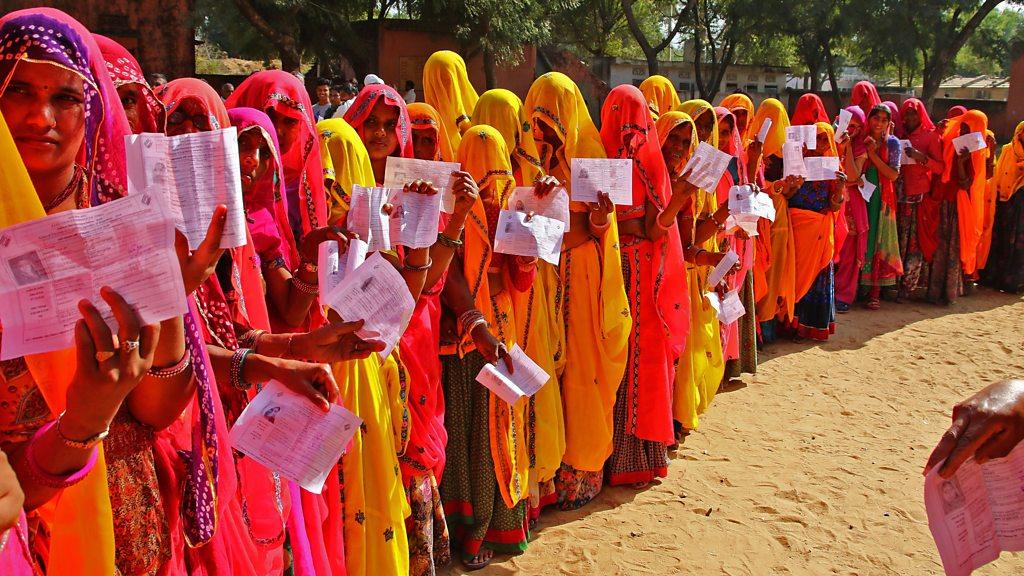
- Published22 May 2018
- Published8 June 2017
- Published11 March 2019
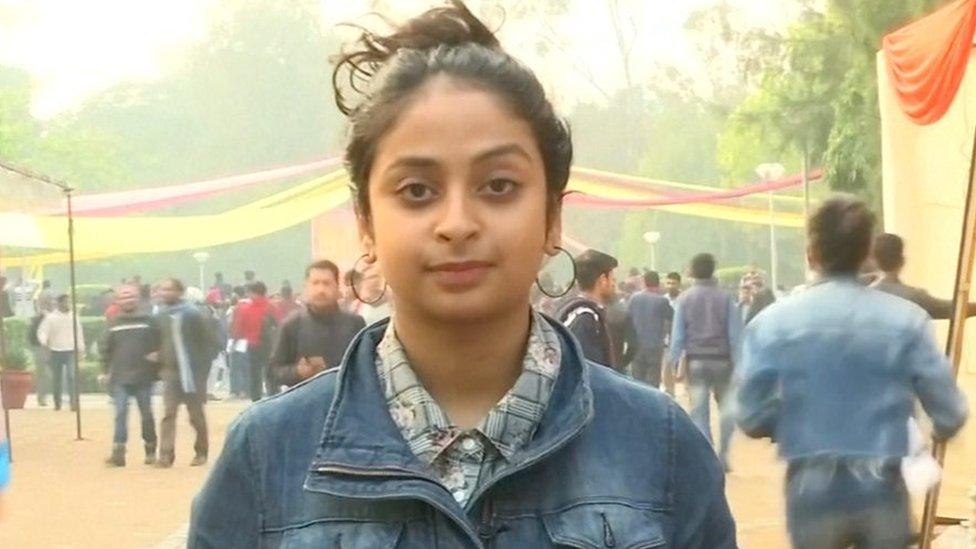
- Published18 March 2019
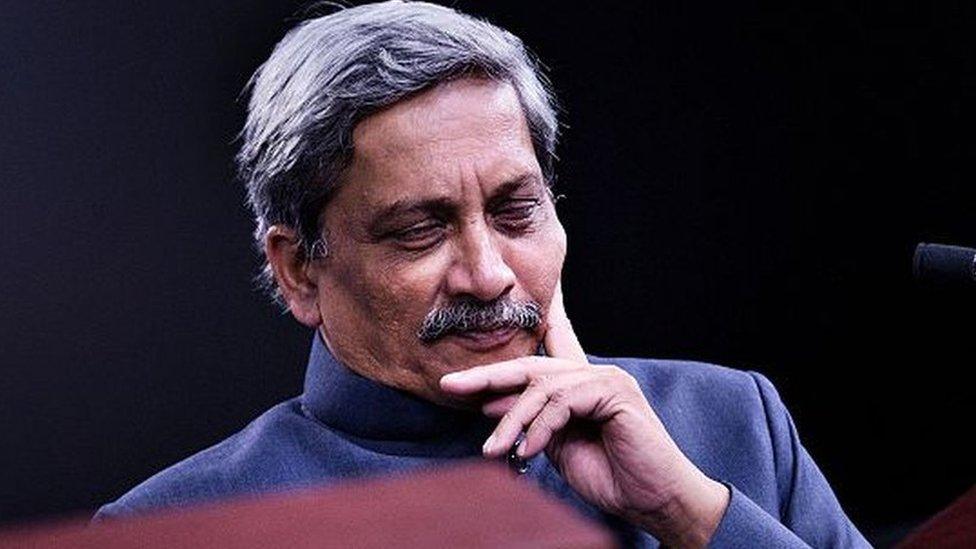
- Published12 December 2018
- Published20 March 2019
